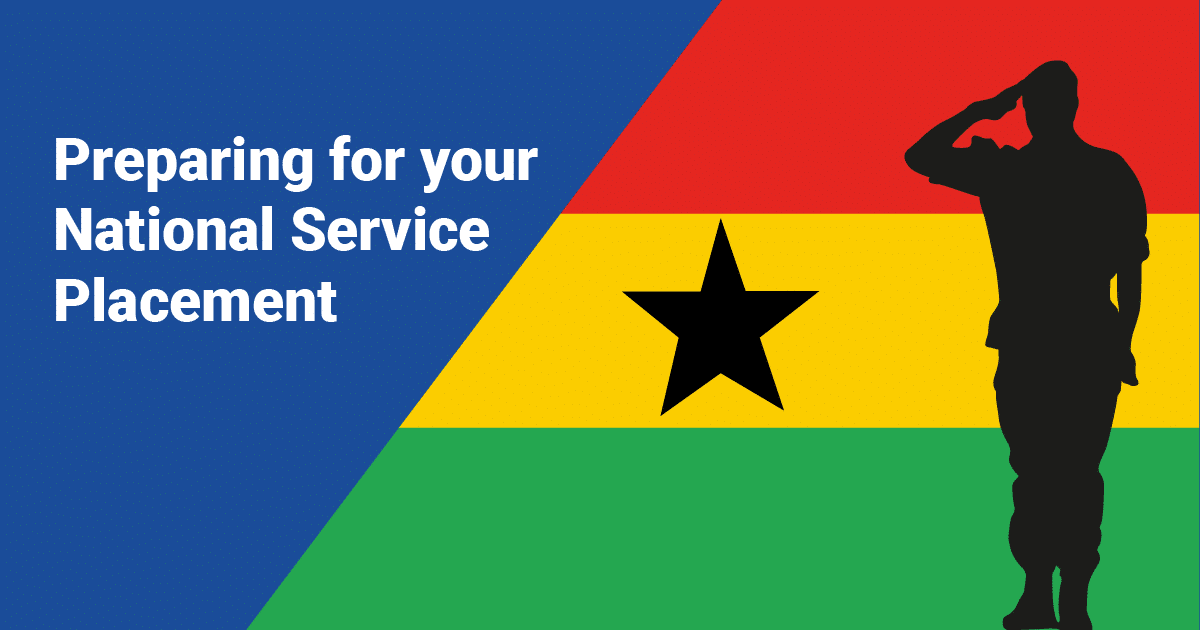In June this year, the National Service Secretariat released the names of some 70,407 prospective National Service personnel for the 2016/2017 national service scheme placement. This list consisted of graduates from tertiary institutions both home and abroad. These people will have their first stint at work-after-school this September. Candidates will be posted to both public and private institutions in Ghana.
Why is National Service Scheme placement Compulsory
Ghanaian students who have completed accredited tertiary institutions are required by law to do a one-year compulsory National Service. The National Service Act of 1980, Act 426 was promulgated and passed by the Parliament of Ghana to give legal and constitutional backing to the scheme.
According to the GNSS website, “The Scheme as currently constituted provides newly qualified graduates with the opportunity to have practical exposure on the job, both in the public and private sectors, as part of their civic responsibility to the State”
If you’re due for national service this year, here are a few points that you should use as guidance to help you enjoy your service, as well as prepare for the larger world of work after the National service.
Tune your Mind and Do your Jobs!
There is mostly a common sentiment among service personnel that they never got posted to their areas of interest. This often times leads to a very lackadaisical attitude at work. Probably this should be the first obvious rule of adult life: You don’t always get what you want! Let it sink in. National service is just national service. You don’t pick and choose. For those posted to rural communities and making complaints, just know that Life is not all about city life. You have been presented with a rare opportunity to take a peep into the everyday life of a less privileged people, whom you’re no better than, except for circumstances. This is a privilege. Whether you aspire to become a public service worker, a politician or a businessperson, rural communities are the windows to the problems and opportunities of this country. Having the privilege to study those problems and opportunities first-hand presents you a great advantage over your colleagues who were born in the cities, and have virtually no rural life experiences.
The advice here is this, do whatever job you’re given to the best of your abilities. This, after all, is temporary. It is also an opportunity to develop a very good work culture. The routine of work and the discipline to keep doing what is required and necessary is what differentiates outstanding workers from others.
Dressing for Work!
This may possibly be your first time of doing an 8-5pm work if you haven’t done any internship during your school day. A lot of you may get confused as to what dress code could pass as indecent. This is no surprise, since most of the guys probably are used to the “otto phister” style of dressing, and the ladies used to wearing scanty clothing. Time to pull your trousers up, and cover yourselves.
As a general rule, for guys, get at least 3 decent trouser in black, grey or dark-blue colours. Get at least one or two very decent pairs of black shoes. Get 3-5 plain colour long sleeve shirts. Good for you if you have a suit. The lack of cash is a general theme that runs among all service personnel unless of course, you come from a well to do family so I will not insist you get a suit and tie. However, be sure to invest in one when you get your allowance as you will need it in your job search, after your service. For ladies, your dressing should cover the essentials very well. Skirts should not be too short and tight as to cause inconvenience to the men in the office. Limit the number of accessories you wear and avoid shiny dresses. Among other things, your general outlook will inform the decision to retain you at your service post or not, if a vacancy comes up within the period.
Certain institutions may require you to wear a uniform, though. For example the recently inaugurated Traffic warden unit. That is an opportunity to save money and stock your wardrobe for post-national service job search.
Keep a Diary.
Most people are not accustomed to keeping diaries, but your National Service could be one of the most adventurous periods in your life, especially for those posted to rural communities or far into the interior. A lot of people have not had the opportunity to live in a rural setting, and the challenges that exist in the rural communities can become an eye opener for you. In fact, most young people have not stayed outside of the home on their own since birth, and relocating to a new community can become unsettling. Keep a diary and do a daily recording of your life, be of adventure, work, misery, mystery or frustration. In this era of technology, keeping a blog that you constantly update is ideal. If you’re posted to a rural community, chances are that you have no access to the internet so keep a paper book diary, or write on your laptop if you have one. You can later set up a blog and publish your experiences. These are memories that you keep forever. Your diary could become the instrument for revealing deeply hidden challenges in the community your serve, and the world could hear about it through your words, or your records could reveal tourism opportunities hitherto unknown to the outside world. By keeping a memoir of your daily life and adventures, you could also serve as a source of inspiration to prospective service personnel who may be posted to the same locale and want to find out key information.
The fears of moving to a new location, are mostly unfounded and national service personnel should cultivate the habit of keeping memoirs, just like the America Peace Copse do. The whole of Ghana can easily be documented and updated as more streams of information are made available by every badge of service personnel.
Carry first Aid Kit!
This goes out to those posted outside to rural areas. Some rural communities lack basic amenities, like pipe borne water, or a nearby clinic. These days, scarcely are service personnel posted to communities devoid of basic social amenities. However, relocating to a new place automatically comes with its own fears, the most prominent of which is being a complete stranger and knowing no one. As a general rule of thumb, carry basic first aid; pain killers, anti-malaria drugs, aspirin, plaster, gauze, methylated spirit for cuts etc. Make sure you have call credit on your mobile phone all time. First aid training is not provided by the NSS. You should take the initiative to obtain this before you start your service.
Make Friends
Once you get to a new community, report to the nearest Police Post and take the phone number of the at least one police office and make friends with them. Also, report to the chief’s palace and introduce yourself. Once you do these things, there is a level of guarantee to your security. It is also advised that you give the phone number of at least two people to your parents back at home, and the vice versa. This is for emergency purposes.
For those still posted within their comfort zone, take the opportunity to make as many friends and network as much as possible. Don’t let work stand in the way of a good relationship. Don’t worry about workers who may want to look down on you. Don’t hold grudges. Do your work, after all, it’s just for one year.
The National Service Scheme is one of the most important schemes instituted with the intention of giving graduates real-life work experience.
How to Have a Memorable National Service
Sometimes people wonder whether it’s national service of national “suffering”. I’m sure a lot of you are debating whether national service should be mandatory for graduates or not. My opinion on that topic is a story that we’ll have to leave for another telling. My focus today is one something different.
Fast forward. Engage your imaginations now. So you have graduated. Congratulations. You’ve probably got your certificate already and the national service Secretariat has posted you to Where? Well wherever they have already posted you or not, I am just here to give a few points on how to make your national service stay a memorable one no matter which corner of Ghana you are stationed or which field of work you have been assigned.
When I say memorable I mean positively memorable. I’m sure we all have memories that are unforgettable. And not all of these memories are so pleasing when we flashback. One year is a lot of time. So as fresh graduates, you cannot let it all go waste.
Never think you’re too big for any Job: let me warn you that national service might not turn out be quite what you expected. You may have to run errands for your superiors and those you work with. And perhaps that is all you may do the whole day. Donkey jobs as some people will term should not bring down your spirit. Just purpose in your mind with an unbroken resolve. Do it and do it wholeheartedly. These are mostly, in a manager or director’s point of view, a test of character and temperament. So it doesn’t matter whether someone who is actually supposed to be below you in terms of academic qualification and rank happens to be the one giving instructions. Remember that a situation like that is temporary and is meant to polish you up as a masterpiece.
Build Great Relationships at Work:
Build a good working relationship with your superiors and other colleagues at work. Consider National service as your first job. Whatever happens at your workplace during this time should not be taken for granted. Remember first impressions matter. Considering that you’d spend a year there at your station, one of your first goals is to ensure that you build a great relationship with all your superiors and colleagues and try to maintain it till you leave. Never go throwing your weight about and parading yourself as the new graduate who thinks he or she knows better than everyone else. Instead be humble. There’s a lot you’ve got to learn even if you graduated with a GPA of 3.9. I have seen several people get their first job after national service because of how they served and recommendations that came from either their superiors or colleagues.
Build Great Relationships with Neighbours:
National service may require that you have to move to a new neighbourhood and geographical area. And through this you’ll meet diverse cultures and values. The best you can do is to let your new neighbours feel comfortable approaching you. That way they’ll be ready to assist you or give advice that may come in handy. There are countless stories of NSS people who got adopted by whole communities and never spent a dime on food and accommodation throughout their period of service. You never know, you might getting free lunch.
Take Up A Responsibility:
Every district has a national service association. Try and join any functional group under this association. Chose to be part of activities organised by your association by participating in them. By doing this you are not only building your leadership and social skills, but also creating a great network that you can make good use in the years that will follow.
Getting Posted To A Village Is Not So Bad.
There’s a positive side you are not looking at. Living in a rural area is truly a once in a lifetime experience for some people. After living in urban areas all your life, making such a quick transition to live in less comfortable settings might come too harsh on you. Just make sure you prepare well enough before you report to your new station. A treated mosquito bed net and a power bank might come in handy. But you should relish every single experience. Help the rural folks anyway you can. I’m pretty sure you might get away with a lot of free lunch and supper. The food is usually so cheap in these areas that you may not have to touch your monthly allowance. If you are a guy, be careful the damsels you strike acquaintances with. One of them might be the chief’s only daughter. Don’t go about taking advantage of village girls. Keep your integrity and virtue.
Identify Business Opportunities:
By now you should know that the government does not always follow the timetable of paying national service personnel. Sometimes you don’t get your allowance until after four months. Perhaps the smartest thing you can do is to start a business no matter how small it is? Please don’t make the excuse of No capital. Remember I said “no matter how small”. You can target your colleague national service personnel for the start. Then everyone else at your workplace, your new neighbours and just anyone who comes your way. Before you realise you’ve got something going for you already. Do this with all diligence. Just be careful your little business does not conflict with your job performance. I am sure aside the second source of income, you’d also learn some skills that are invaluable.
Don’t spend all your monthly allowance.
Yes it’s small but save some. I know how small it is and how it is barely enough for anything. For most of you it’s your first source of steady stream of income. That’s the time to start developing the habit of saving if you don’t have it already. Just determine that you’ll put something away every month and when you’re done with the service, Invest that money no matter how small it is into something that you sure will remember for the rest of your life.
So there we have it. National service is not always pleasant experience. But how much of it you enjoy depends on you. See it as what it is. A Service to your nation. If you think something was worth mentioning but I left it out, feel free to let me know in the comments section. And we’ll take it up in latter discussions. Always be patriotic and look on the brighter side. Happy national Service!
Have more tips to add? Please put them in the comments section below.





